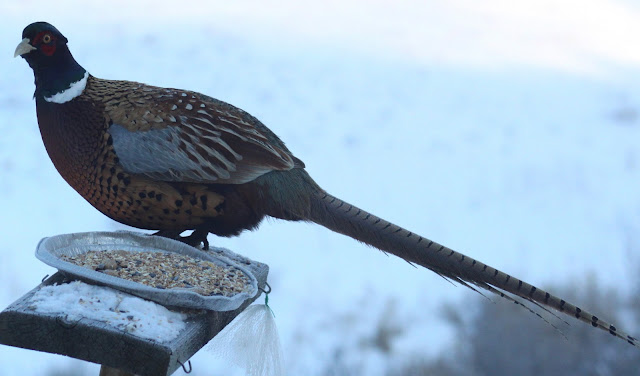Early yesterday morning, I went over to my friends', Barry & Marilyn, place (a block away) to watch the pheasants come in to their backyard to feed.
This was only a few of the 70+ that congregated in the bushes and trees where Barry puts out seed.
Sorry, these photos aren't very good. The light was poor for pictures as I was taking from inside the house, the sun wasn't very high in the sky and it is a north-facing yard.
I didn't realize there was such a great variation in the colour of the crests of the males. Decades of hybridization, I guess. Some have very prominent and white crests.
Others are more of a slaty-grey (I know, can't really see that from the photo)
And others are dark (ditto above - plus these birds are very skittish and any movement or tiny flash of light scares them)
And, it was COLD yesterday morning. The birds were fluffed out and looked like painted basketballs with long-tails
There are about thirty subspecies of Phasianus colchicus and from the looks of things, at least 3 or 4 subspecies were part of past raise and release programs.
All pheasant populations around here these days are wild breeding populations. We have a lot of them. Farmers and wildlife friendly people like my friend Barry put out seed to help the birds (and subsequently other animals) get through our harsh, long, deep-snow, winters. UPDATE: Barry tells me 1 or 2 people here raise pheasant chicks every year - most are sold en masse to property owners elsewhere to release - hunting, you know.
Unlike the native grouse, pheasants don't have thick, feathered feet. They lose heat from their feet and also don't have the 'snowshoe effect' going on.
Info about the Common Pheasant (Phasianus colchicus)
http://en.wikipedia.org/wiki/Common_Pheasant
This was only a few of the 70+ that congregated in the bushes and trees where Barry puts out seed.
Sorry, these photos aren't very good. The light was poor for pictures as I was taking from inside the house, the sun wasn't very high in the sky and it is a north-facing yard.
I didn't realize there was such a great variation in the colour of the crests of the males. Decades of hybridization, I guess. Some have very prominent and white crests.
Others are more of a slaty-grey (I know, can't really see that from the photo)
And others are dark (ditto above - plus these birds are very skittish and any movement or tiny flash of light scares them)
And, it was COLD yesterday morning. The birds were fluffed out and looked like painted basketballs with long-tails
There are about thirty subspecies of Phasianus colchicus and from the looks of things, at least 3 or 4 subspecies were part of past raise and release programs.
All pheasant populations around here these days are wild breeding populations. We have a lot of them. Farmers and wildlife friendly people like my friend Barry put out seed to help the birds (and subsequently other animals) get through our harsh, long, deep-snow, winters. UPDATE: Barry tells me 1 or 2 people here raise pheasant chicks every year - most are sold en masse to property owners elsewhere to release - hunting, you know.
Unlike the native grouse, pheasants don't have thick, feathered feet. They lose heat from their feet and also don't have the 'snowshoe effect' going on.
Info about the Common Pheasant (Phasianus colchicus)
http://en.wikipedia.org/wiki/Common_Pheasant






70+.... wow. Maybe I shouldn't have given up pheasant hunting for birding? Just kidding! When I got Baron instead of my usual Lab or Chessie, I knew my commitment to hunting birds was totally going to be with a camera.
ReplyDeletehee hee..they do look like basketballs and footballs that have been painted.
ReplyDelete